Most anything composed of clean paper can be recycled, and that certainly extends to books. However, recycling books should be your last option. This article will explain all the different ways you can make room on your bookshelf while keeping books out of the landfill.
“There is more treasure in books than in all the pirate’s loot on Treasure Island.” – Walt Disney
If you’re anything like me, you’ve got a bookshelf at home that is overflowing with books. Some that you’ve read many times and some that you put down after the first few pages. You’ll finish reading those again one day, right?
When it’s time to clear out some room for new books that you may or may not ever read, what do you do with the old ones? Don’t throw them away! Please, anything but that. It’s a sin to throw away a perfectly good book.
So many books!
Why should we worry about what we do with old books, you may ask? You may be shocked to learn just how many books are created each year. According to Statistica, over 788 MILLION printed books were sold in 2022 alone. The number has hovered between 591 million and 843 million over the past 19 years, averaging somewhere around 700 million per year.
Around 15 billion books have been produced and sold so far this century. And it only includes SOLD books, not those that are printed and never sold! Oh – and that number only includes the United States.
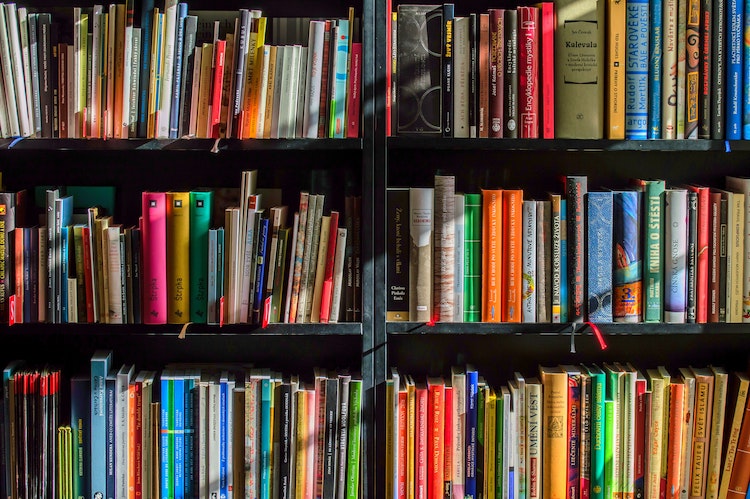
Estimates for the number of books made globally each year are as high as 2 billion! This creates a HUGE environmental impact. The best way to offset this impact is to read ebooks, which have very close to 0 climate/environmental impact, and save the electricity generation to power the device you read it on.
Those 2 billion books require somewhere on the order of 30 million trees to produce, which is 60 square miles worth of forests each year.
And some people just throw those books in the trash. What a waste!
We can do better! There are so many different ways to get rid of your unwanted books, including recycling! We’re going to look into all facets of the three ways we can keep books out of the trash: donating, selling, and recycling.
Check if the book can be sold or donated
Before considering the question “Can you recycle books?”, it’s important to determine if your books can be sold or donated. This is a more environmentally-friendly option as it extends the lifespan of the book and reduces waste.
When you donate or sell your used books, you give them a new life, allowing others to enjoy the knowledge, stories, or information they contain. By doing so, you’re helping to conserve resources, save energy, and reduce the need for new materials. In contrast, recycling requires energy to process the books into new paper products, while donating or selling preserves the original material for a longer period of time.
Choosing to recycle books is certainly better than throwing them into the landfill, but extending their useful life is the best option of all!
Tips for checking if a book can be sold or donated
To determine if a book can be sold or donated, consider the following:
- Check the condition of the book. Is it clean, unmarked, and free of damage? Books in good condition are more likely to be accepted by donation centers or sold to others.
- Assess the content. Is the book outdated or irrelevant? If so, it may be more suitable for recycling. However, if the book contains timeless information or classic literature, it’s likely a good candidate for donation or sale.
- Research the book’s value. Some books may have collector’s value, making them more desirable for sale or donation.
Where you can donate books
Donating your used books is a great way to keep them in circulation and benefit others. There are a ton of options for donating your books:
Friends of the Library groups
Friends of the Library groups are volunteer-based, nonprofit organizations that support public libraries through fundraising, advocacy, and various services. These groups are typically made up of local community members who are passionate about promoting the value and importance of libraries in their local communities.

Friends of the Library groups collect used books for several reasons:
- Book sales: One of the primary ways Friends groups raise funds for libraries is by organizing used book sales. They collect donated books from community members, sort and price them, and then sell them at book sales or in designated areas within the library. The proceeds from these sales directly support the library’s programs and services.
- Recycling and sustainability: Collecting used books helps to promote sustainability by keeping books in circulation and out of landfills. By finding new homes for these books, Friends groups contribute to a more eco-friendly community.
- Literacy promotion: In some cases, Friends groups may donate collected books to local schools, community centers, or other organizations to promote literacy and provide reading materials to those who may not have easy access to books.
By donating your old books to a Friends of the Library group, you can support your local library, promote literacy, and contribute to a more sustainable community.
Freecycle
Freecycle is a grassroots movement that encourages the free exchange of goods within communities. You can post your books on your local Freecycle group’s website to find a new home for them.
Local Literacy Programs
Local literacy programs are community-based initiatives that aim to improve reading, writing, and language skills among individuals of all ages. These programs often provide targeted support through tutoring, workshops, and educational resources to help participants enhance their literacy levels.
By working closely with schools, libraries, and other community organizations, local literacy programs promote lifelong learning and empower individuals to reach their full potential.
To find literacy programs near you, check the National Literacy Directory hosted by ProLiteracy

Books Through Bars
Donate books to Books Through Bars and you’ll help provide educational and reading materials to incarcerated individuals, promoting personal growth and reducing recidivism. To donate, check the organization’s website for specific guidelines and mailing addresses, and make sure the books you send to them align with their accepted genres and subjects.
Local Schools and Daycare Centers
I imagine that like me, many of you have kids and have a ton of children’s books at home. When your kids outgrow them, those books are like gold. Schools and daycares would almost certainly be happy to take a few books off your hands and read them to the next cohort of little ones.
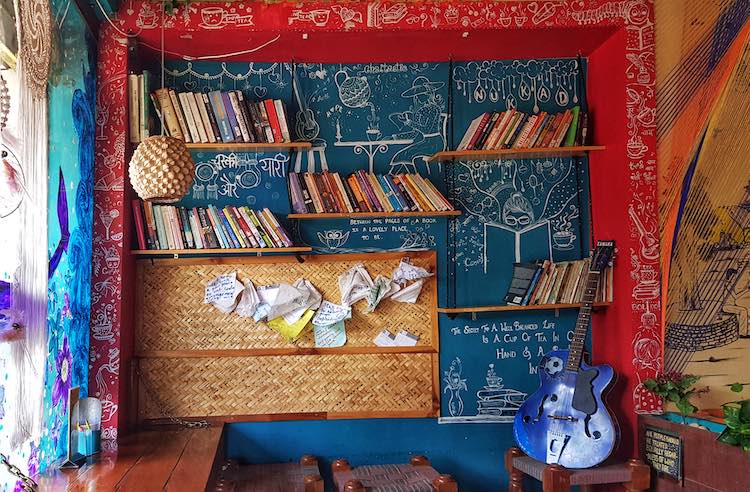
Little Free Library
I’ve got a little free library directly across the street from my house! You’ve probably seen them, they almost look like a birdhouse, but they’re filled with books. It’s like the old “need a penny, take a penny, got a penny, leave a penny”, but as a book swap.
By donating books to Little Free Libraries, you contribute to a community-based book-sharing movement that promotes literacy and the love of reading.
Goodwill/Salvation Army
These organizations (and most other thrift stores) accept a variety of used items, including books, for resale. If you’re like me, you’ve probably got a box of old clothes you’ve been meaning to drop off at the thrift store. Toss your old books in there too – and then actually go drop them off!
One thing to keep in mind – proceeds from sales support their charitable initiatives. If you’re not aligned with their charitable activities or philosophy, you may want to look at other options.
Sell your books
If you’d like to make some extra cash while keeping your books in circulation, consider selling them.
First things first – are your books “Very Good (VG)”? Books in very good condition are more likely to sell. If your books are free of markings, have intact bindings, and show minimal wear, they may fetch a higher price.
Here are some options for places to sell old books:
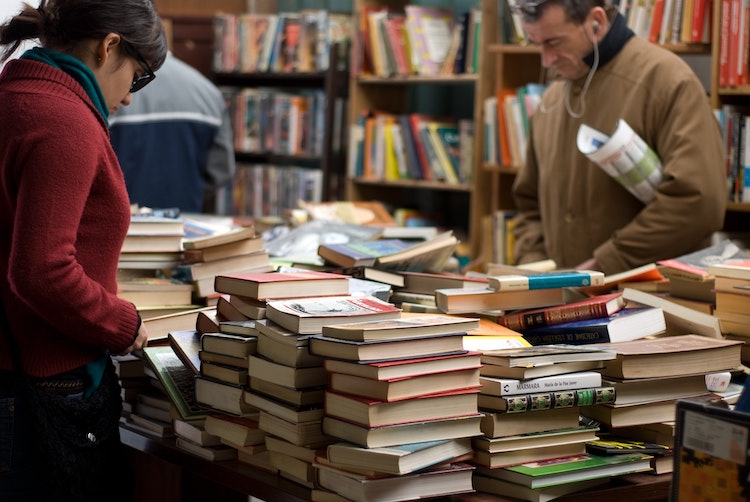
Sell Used Books Online Using BookScouter.com
BookScouter is a website that allows you to compare buyback prices from multiple book-buying websites. Simply enter the ISBN, and you’ll see a list of offers from various companies.
Sell Used Books to Local Independent Bookshops + Half Price Books Stores
Many local independent bookshops and Half Price Books stores buy gently used books. Visit your local store to see if they’re interested in purchasing your books.
Sell Used Books on Ebay
Ebay is a popular online marketplace for selling used items, including books. You can create a listing with photos and a description of your book to attract potential buyers.
Sell Used Text Books to a college bookstore…
JUST KIDDING! College bookstores typically offer pennies on the dollar for old textbooks (or textbooks that were brand new 3 months ago, and look flawless). You’d be better off with any other possible option.
Understanding The Recycling Process
Once you’ve determined that you want to recycle books that are not suitable for donation or sale, it’s time to consider the recycling process.
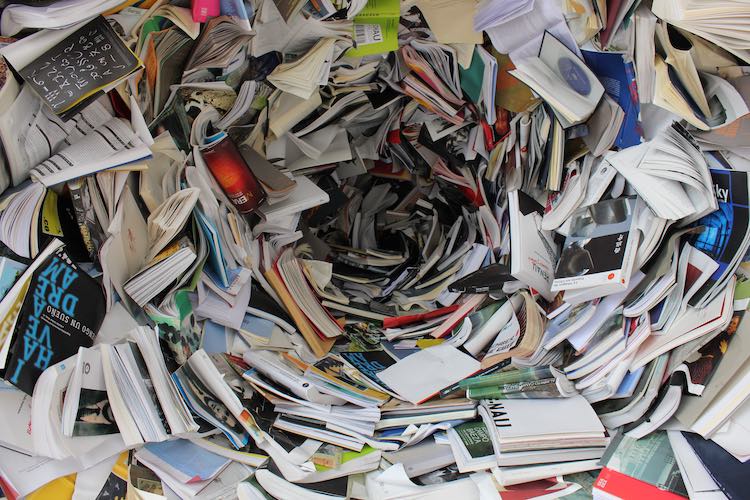
What are books made from?
Books are primarily made from paper, which comes from wood pulp. The covers of hardcover books are often made from cardboard or other paper materials, while paperback books typically use heavier paper or thin cardboard for the cover. Some books may have non-paper components, such as plastic covers, metal bindings, or adhesives.
Can you recycle hardcover books?
Yes, you can recycle hardcover books nearly as easily as you can recycle paperback books. However, you may need to remove the cover and any non-paper components before placing the book in the curbside recycling bin. Check with your local recycling center for specific guidelines.
Can textbooks be recycled?
Textbooks can be recycled in the same manner as other hardcover or paperback books. The paper they use is especially sturdy and glossy, but it’s ultimately more similar to regular paper than photo paper (which isn’t recyclable). Like everything else – be sure to remove any non-paper components, such as plastic covers or metal bindings, before recycling.
Can phone books be recycled?
Phone books are generally made from low-grade mixed paper, making them suitable for recycling. Many curbside recycling programs accept old phone books, but checking your local program’s guidelines is always a good idea.
How do paper recyclers process books?
The recycling process for books begins with the collection of mixed paper materials. Books are then transported to a recycling facility, where they’re sorted and shredded. The shredded paper is mixed with water and chemicals to break down the fibers, creating a pulp. This pulp is cleaned, screened, and de-inked to remove any contaminants. Finally, the clean pulp is pressed and dried to create new paper products.
Does the ink on book and magazine paper affect recycling?
The ink used in books and magazines does not typically hinder the recycling process. During the de-inking stage, most ink is removed from the pulp, ensuring that the final recycled paper product is free of contaminants.
Recycling paper products
Recycling paper products, including books, is an important step in reducing waste and conserving resources.
How paper recycling works
Paper recycling involves the collection, processing, and transformation of used paper materials into new paper products. It follows 6 main steps:
- Collection: Used paper materials, including newspapers, magazines, office paper, and books, are collected from households, businesses, and recycling centers.
- Sorting: At the recycling facility, paper materials are sorted into different grades, such as mixed paper, cardboard, and newspaper, to ensure they are processed efficiently.
- Pulping: Sorted paper is shredded and mixed with water and chemicals to break down the fibers, creating a pulp.
- Cleaning and de-inking: The pulp is cleaned, screened, and de-inked to remove contaminants such as plastic, staples, and ink.
- Formation: The clean pulp is then spread onto a paper machine, which removes the water, and the fibers bond together to form a continuous sheet of paper.
- Drying and finishing: The newly formed paper is pressed and dried before being wound onto large rolls, which can then be cut into smaller sheets or used to create new paper products.
Types of paper products that can be recycled
Assuming it is clean and dry, almost all types of paper products can be recycled, such as:
- Books
- Newspapers
- Magazines
- Office paper
- Cardboard
- Paperboard
- Junk mail
It may be more useful to list the types of paper products that CANNOT be recycled:
- Photographs
- Blueprints
- Sticky notes
- Carbon paper or NCR (No Carbon Required – a new type of copy transfer paper, without the carbon)
- Laminated paper (either with plastic or metal-lined) or Wax paper
- Stickers
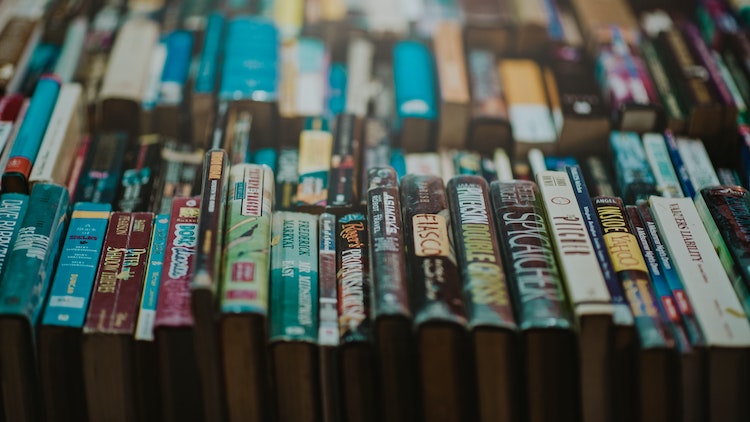
What products are made out of recycled books?
Recycled books are transformed into new paper products, including:
- Toilet paper
- Tissue paper
- Paper towels
- Cardboard
- Newspaper
- Writing paper
- Packaging materials
- More books!!!
How to prepare books for recycling
Properly preparing your books for recycling ensures that they can be successfully processed into new paper products.
Step-by-step instructions for preparing books for recycling
- Remove any non-paper components, such as plastic covers or metal bindings.
- Separate hardcover books from their covers if required by your local book recycling program.
- Place the paper components of the books in your recycling bin or take them to a designated recycling drop-off location.
Tips for removing any non-paper components, such as plastic covers or metal bindings
- Use a box cutter or utility knife to carefully remove plastic covers from books.
- If a book has metal bindings, use a pair of pliers or wire cutters to remove them.
- For glued bindings, use a razor blade to separate the spine from the pages.
Where to recycle books
There are various options for recycling books, depending on your location and local recycling programs.
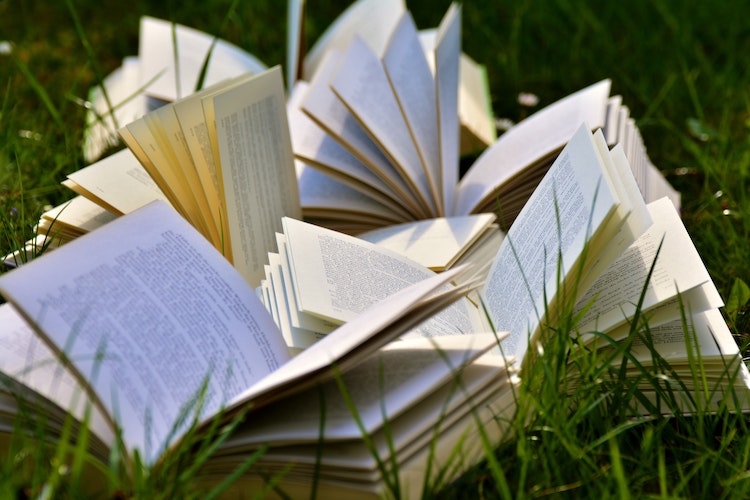
Recycle Books Through Curbside Recycling Programs
A curbside recycling program often accepts books as part of its mixed paper collection. Check with your local recycling program to confirm that they accept books and any specific preparation requirements.
Local recycling programs vary by city or region. To find information about your area’s recycling program, visit your city or county’s website or contact their waste management department. It may be that they don’t allow books in your home bin, but have a special drop-off location for them.
Organizations that specialize in book recycling
Some organizations focus on book recycling and may accept books for recycling, including:
- Better World Books: This organization collects and sells used books, using the proceeds to fund literacy programs. They also recycle any books that are not suitable for resale.
- Earth 911: This website provides a searchable recycling directory that can help you find local recycling options for books and other materials.
Finding book recycling programs in other countries
If you’re located outside of the United States, consider the following tips for finding book recycling programs:
- Search online for local recycling programs or contact your city or regional waste management department.
- Inquire at local libraries or schools to see if they have book recycling programs or can recommend any resources.
- Visit recycling-focused websites or forums specific to your country for information on how to recycle books.
Conclusion
In this blog post, we’ve explored the various options for extending the life of your used books through donation or sale, as well as the process of recycling books when they’re no longer usable. By considering these alternatives to simply discarding books, you’re contributing to a more sustainable world and giving these valuable resources a new purpose.

In summary:
- Donating or selling books is a more environmentally friendly option than recycling.
- Books can be donated to organizations like Friends of the Library or local Literacy groups, Books Through Bars, or sold through online platforms and local bookstores.
- You can recycle books, but may require some preparation, such as removing non-paper components.
- Local recycling programs and specialized organizations can help you recycle your books.
Don’t let your books end up in the trash!
By donating, selling, or recycling your books, you can ensure that they continue to serve a purpose and don’t contribute to overflowing landfills. Remember to check your local recycling guidelines and give your books a new life through donation or sale when possible. Together, we can make a positive impact on the environment and promote a more sustainable future.